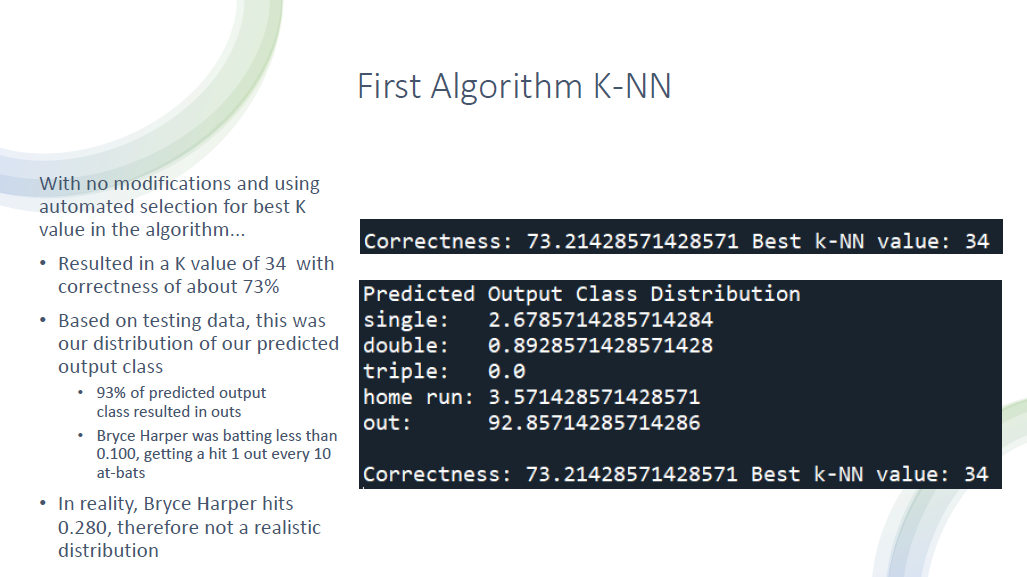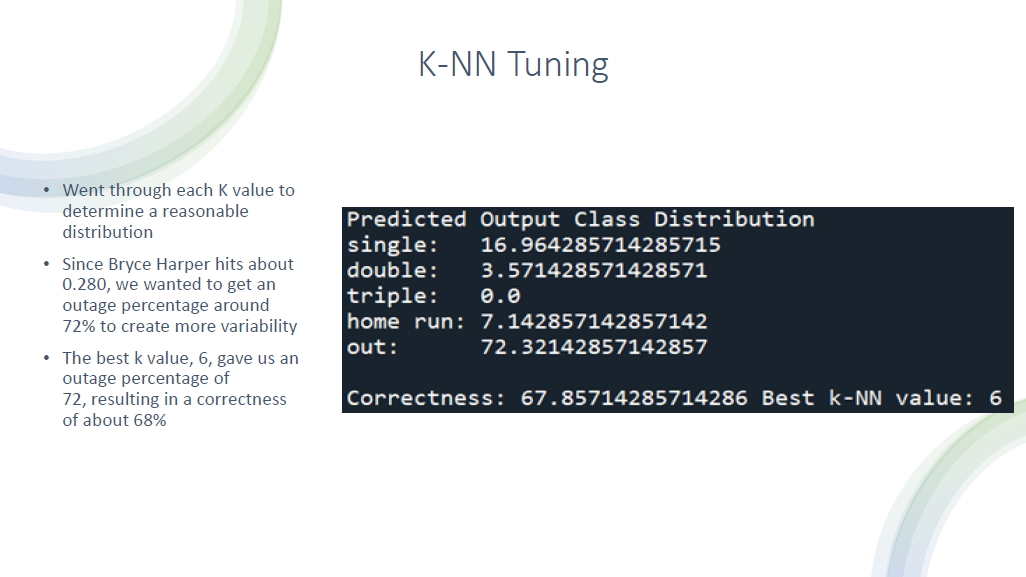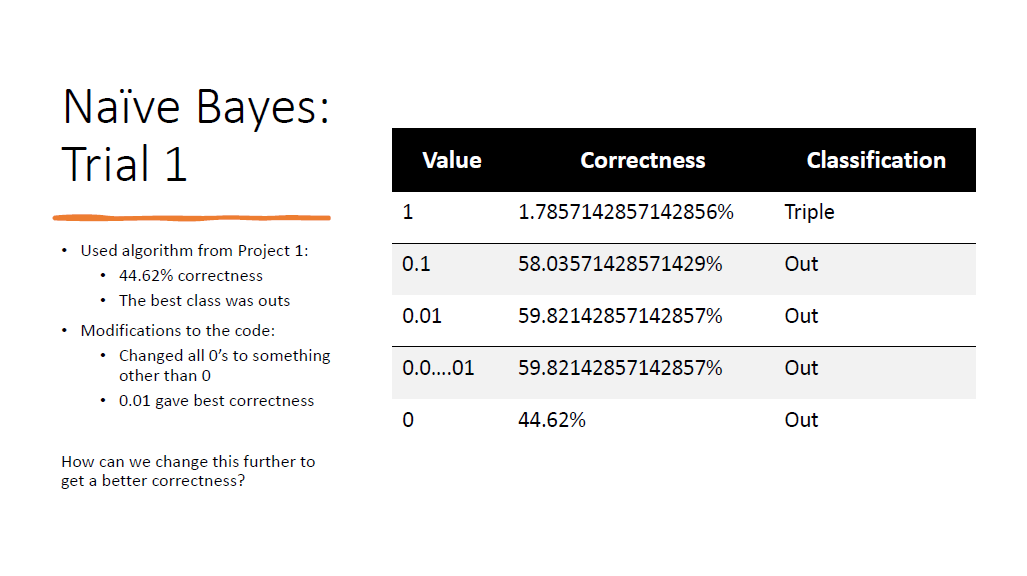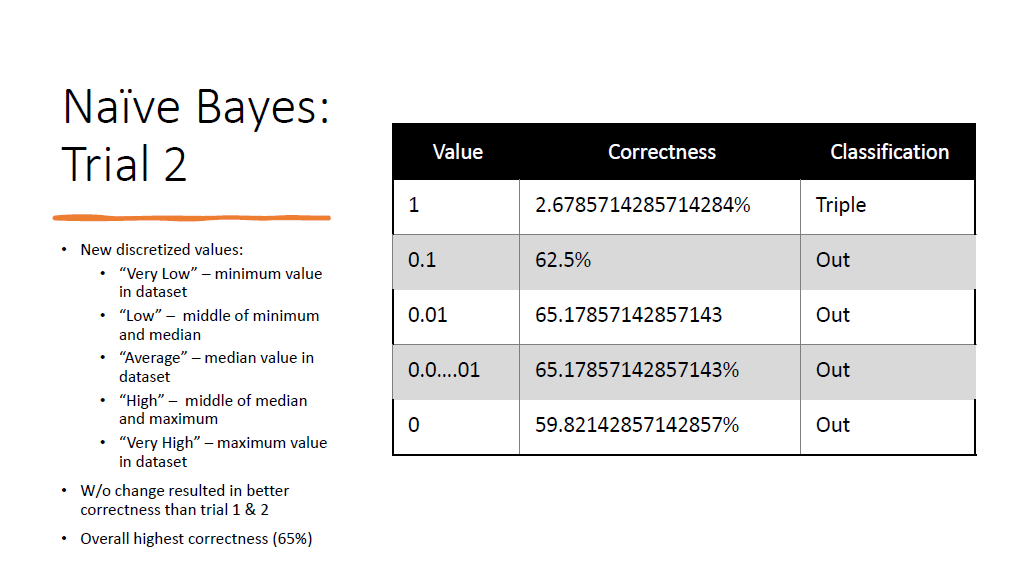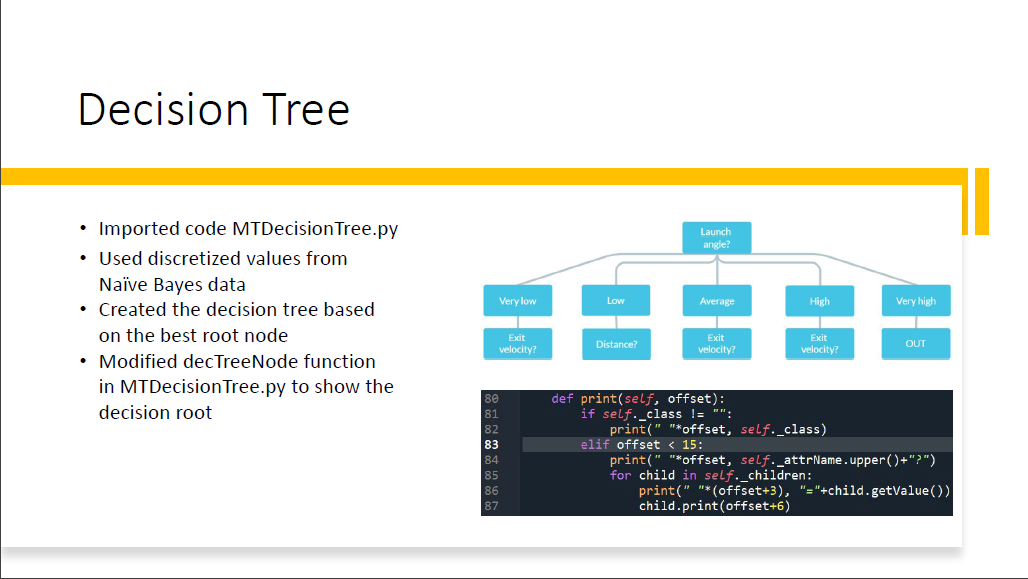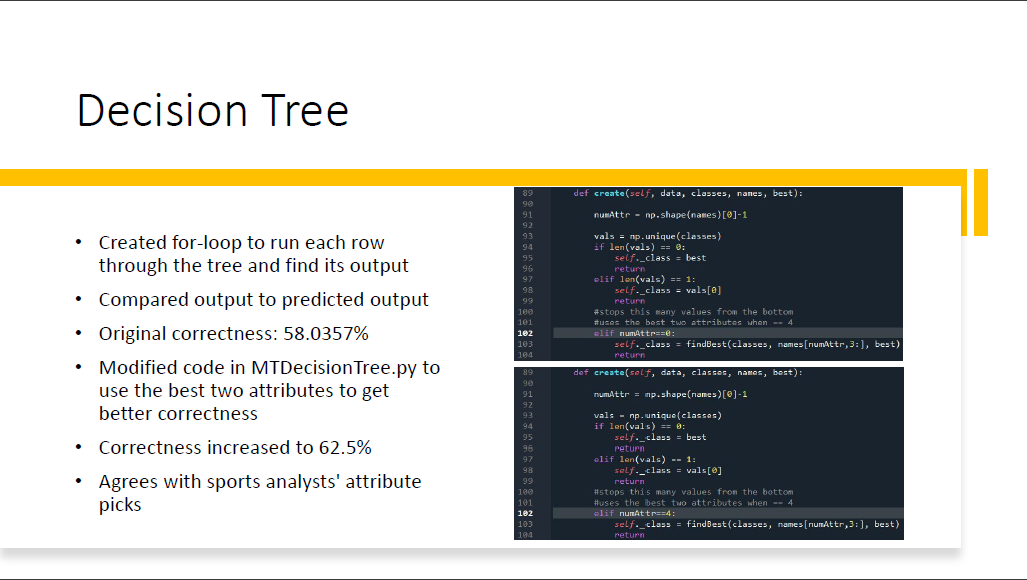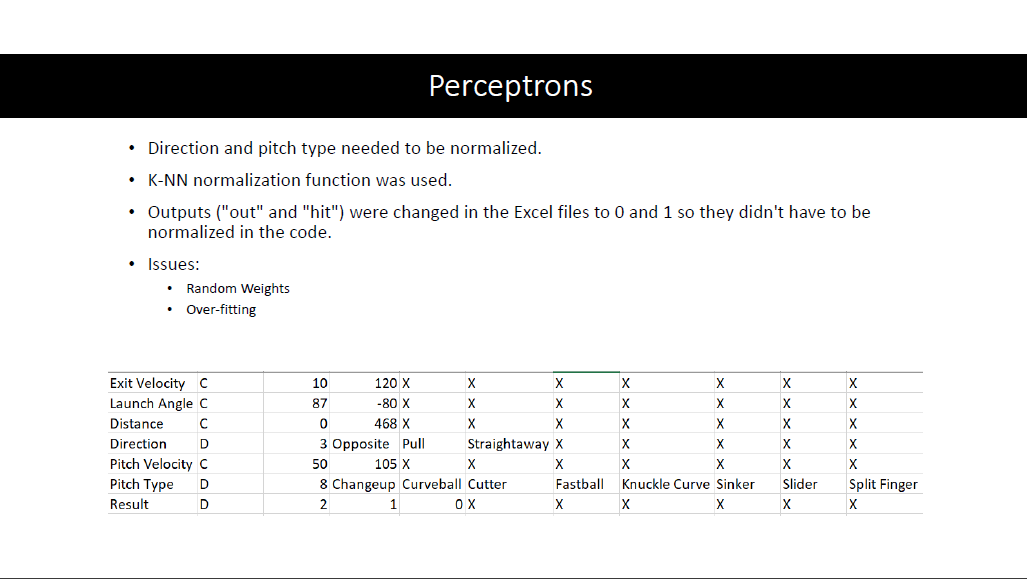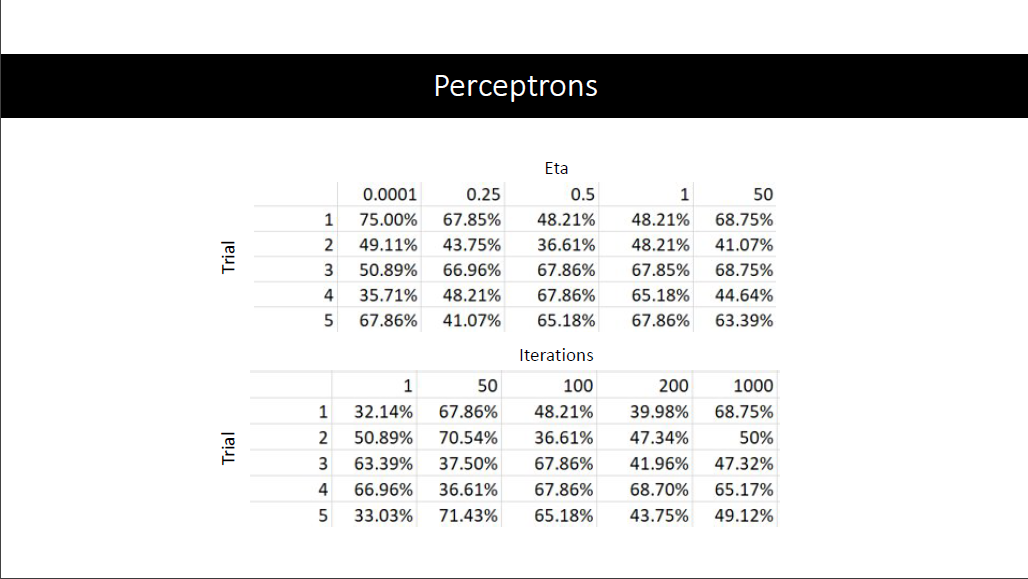Decision Tree
This was my part of the project and the code can be seen below:
# -*- coding: utf-8 -*-
"""
@author: Daniel Ruiz
"""
import MTDecisionTreeP3 as dt
import numpy as np
# start the main
def main():
namesData = np.genfromtxt('DTNames.csv', delimiter=',', dtype = 'str')
rawTrain = np.genfromtxt('DT85Train.csv', delimiter=',', dtype = 'str')
myTest = np.genfromtxt('DT15Test.csv', delimiter=',', dtype = 'str')
root = dt.DecTreeNode()
# optional - initialize default class to use in case of tie or no examples
# divide the training data into the data and the class
myTrainClass = rawTrain[:,np.shape(rawTrain)[1]-1]
myTrain = rawTrain[:,:np.shape(rawTrain)[1]-1]
# divide the testing data into the data and the class
myTestClass = myTest[:,np.shape(myTest)[1]-1]
myTestData = myTest[:,:np.shape(myTest)[1]-1]
nameRows = np.shape(namesData)[0]
testRows = np.shape(myTest)[0]
# Can hard code best if tie (out) or use value from myNames[numberColumns-1,3]
bestValue = dt.findBest(myTrainClass, namesData[nameRows-1,3:], namesData[nameRows-1,3])
# bestValue = dt.findBest(myTrainClass, namesData[nameRows-1,3:], "out")
# Choose one depending on what you did above
root.create(myTrain, myTrainClass, namesData, bestValue)
# root.create(myTrain, myTrainClass, namesData, "home run")
# uncomment to print tree
# root.print(0)
correctness = 0
for i in range(testRows):
treeClass = root.classify(myTestData[i,:])
# uncomment to show results for each line
# print(i, treeClass)
if myTestClass[i] == treeClass:
correctness = correctness + 1
print("Correctness: ", round((correctness/testRows)*100, 4))
if __name__ == "__main__":
main()
Output:
Correctness: 62.5
Here is MTDecisionTreeP3:
# -*- coding: utf-8 -*-
"""
@author: Professor Michael Thompson
"""
import numpy as np
import math
def findBest(classes, classNames, best):
numVals = len(classNames)
count = np.zeros(numVals)
for i in range(numVals):
count[i] = np.shape(np.where(classes == classNames[i]))[1]
bestIndex = 0
for i in range(1, numVals):
if count[i] == count[bestIndex] and classNames[i] == best:
bestIndex = i
elif count[i] > count[bestIndex]:
bestIndex = i
return classNames[bestIndex]
def entropy(data, classNames):
mySum = 0
total = np.shape(data)[0]
for cVal in classNames:
ind = np.where(data == cVal)
num = np.shape(ind)[1]
if num > 0:
mySum -= (num/total)*math.log2(num/total)
return mySum
def gain(data, classes, names, index):
numAttr = np.shape(names)[0]-1
gVal = 0
cls = names[numAttr, 3:]
ent = entropy(classes, cls)
total = np.shape(data)[0]
for i in range(int(names[index,2])):
ind = np.where(data[:,index] == names[index, i+3])
num = np.shape(ind)[1]
if num > 0:
redClasses = classes[ind]
gVal += (num/total)*entropy(redClasses, cls)
return ent - gVal
class DecTreeNode:
def __init__(self):
self._children = []
self._parent = ""
self._attribute = -1
self._attrName = ""
self._value = ""
self._class = ""
def getValue(self):
return self._value
def setValue(self, v):
self._value = v
def classify(self, example):
if self._class != "":
return self._class
else:
for child in self._children:
if example[self._attribute] == child.getValue():
example = np.delete(example, self._attribute, axis=0)
return child.classify(example)
print("OOPS!!", example)
def print(self, offset):
if self._class != "":
print(" "*offset, self._class)
# changed from else to elif; canalso increase number to show more of tree
elif offset < 15:
print(" "*offset, self._attrName.upper()+"?")
for child in self._children:
print(" "*(offset+3), "="+child.getValue())
child.print(offset+6)
def create(self, data, classes, names, best):
numAttr = np.shape(names)[0]-1
vals = np.unique(classes)
if len(vals) == 0:
self._class = best
return
elif len(vals) == 1:
self._class = vals[0]
return
# stops this many values from the bottom
# uses the best two attributes when == 4
elif numAttr==4:
self._class = findBest(classes, names[numAttr,3:], best)
return
else:
# Find attribute with best gain
bestGain = gain(data, classes, names, 0)
bestAttr = 0
for i in range(1, numAttr):
thisGain = gain(data, classes, names, 1)
if thisGain > bestGain:
bestGain = thisGain
bestAttr = i
self._attribute = bestAttr
self._attrName = names[bestAttr,0]
# create child for each value
for i in range(int(names[bestAttr, 2])):
x = DecTreeNode()
newInd = np.where(data[:,bestAttr] == names[bestAttr, 3+i])
newData = data[newInd,:][0]
newClasses = classes[newInd]
newData = np.delete(newData, bestAttr, axis=1)
newNames = np.delete(names, bestAttr, axis=0)
newBest = findBest(newClasses, newNames[numAttr-1,3:], best)
x.create(newData, newClasses, newNames, newBest)
x.setValue(names[bestAttr, 3+i])
self._children.append(x)



